This blog operates from the starting point that racism exists in the canon and fandom whether you like it or not. // Gathering of tumblr posts, not other resources // Reblogs do not indicate agreement or endorsement // This is a place for celebration of pro-diversity as well as a breaking down of racism // Tags and Topics List
Don't wanna be here? Send us removal request.
Text
Noldorin Music; Afrobeat from Cuivinen to Valinor and back again.
Wanted to make a list of some afrobeat and adjacent songs that I associate with the noldor and other elven groups and why. It's great to see more elves of colour in art but skin colour isn't just an aesthetic, and its weird to see black characters only ever given white voices in music recs or playlists. This is just a small selection of headcannons I personally enjoy, I greatly encourage y'all to seek out other black artists to listen to.
Soso by Omah Lay. Older hymn from before the crossing, passed down more as a relic of old fear, has its resurgence among the noldor in Beleriand especially after the bragolach. Less of an entreaty to the valar than a demand for intervention from anyone who might hear. A desperate plea for anyone to take pity.
Love Nwantiti Remix by Ckay. You know the tra-la-la-lally elves that sing at bilbo and the dwarves in Rivendell? This is the Valinor equivalent. You are wandering Oromë's woods when you walk into a clearing full of half naked somewhat tipsy elves all dancing around and singing this.
Johnny by Yemi Alade. A song from before the crossing about a lady hunting down and beating up her cheating bf who is going around promising other women marriage and knocking them up. I have a vivid image of Míriel wine drunk at a party post-reimbodiment bursting into this song with Indis joining her. Everyone else is holding their breath waiting for an Incident... except Finwe, who is pissing himself laughing and actively cheering them on.
Pull up by Burna Boy. My hc is that Fingon is singing something similar to this in angband. It's completely unserious, just a fun song he remembers from home, remembers singing it outside Maitimo's window to bother him and make him come out faster. He's not expecting the wavering voice following his, thinks he's imagining it until it breaks away from his entirely and continues when he stops.
AKWAABA by GuiltyBeatz and Mr Eazi. Specifically a song for the weird cultural mishmash that occurred in communities built by thralls who escaped angband. Songs tend to be light on lyrics or include multiple languages. More about the sound of the music and embracing the feeling that your body is yours again, dance with us, you are free, go crazy, you are welcome here.
Bloody Samaritan by Ayra Starr. A prayer sung by Beleriand noldor, but not a serious one. Essentially used as a way to warn others you won't take their judgement while using the format of a prayer, like saying "God do you see this shit??" I associate this song with Galadriel in Doriath, dealing with rumours spread about her.
Bank on it by Burna Boy. The closest thing to a prayer that the thralls of angband's fighting pits have. A prayer for survival and for forgiveness for what they must do to survive. It's in Old Quenya, the first tongue. There's an intimate solidarity and fear between those who know it.
9 notes
·
View notes
Text

Welcome to Tolkien Latin American and Caribbean Week 2024!
A week dedicated to celebrate Latin American and Caribbean cultures, peoples and traditions through Tolkien's Legendarium. It will start on October 21st (Monday) at 00:00, Brasilia time (what time is it in my country?). The week will end on October 27th, but feel free to post after the week is over. I'll still check tags, mentions and submissions for a while.
Everyone is free to participate, you don't have to be latino or caribbean nor have deep knowledge about Latin America/Caribbean to participate on this event. All creations are welcome - arts, graphics, gifs, fanfics, etc. - as long as they represent a Latin American/Caribbean element(s). It can be languages, cultures, traditions, anything from Latin America/Caribbean. Creations should be Safe for Work, no explicit content will be accepted to make this week accessible to everyone.
Please don't forget to tag your contributions with #tolkienlatam&caribbeanweek and mention me @tolkienlatamandcaribbeanweek.
Here are the prompts! They are not mandatory, but they can inspire you. Feel free to create outside these themes.
↬ Day One: Eru Ilúvatar | The Beginning | The World and All That Is
↬ Day Two: Ainur | The Powers of Arda | The Shaping of Arda
↬ Day Three: Eldar | The Awakening | Those Who Stayed and Those Who Left
↬ Day Four: Dwarves | Family | Culture
↬ Day Five: Men | Ancestors | Kingdoms
↬ Day Six: Hobbits | Dances | Music
↬ Day Seven: Freeform | AU | OCs
Last, but not least, don't forget to check the pinned post with rules, FAQ, other notes, etc.
118 notes
·
View notes
Text

Tolkien Latin American and Caribbean Week 2024 will happen! From October 21st to October 27th. Details coming soon!
33 notes
·
View notes
Text
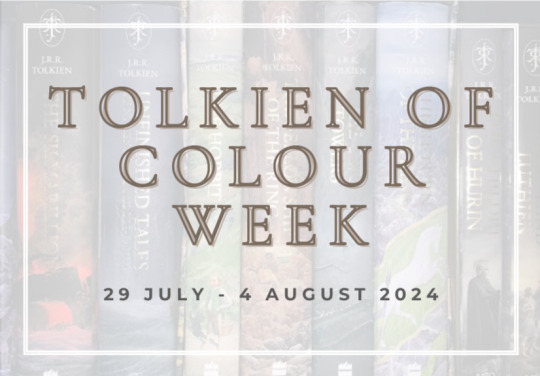
Tolkien of Colour Week: 29 July to 4 August 2024
Prompts to be announced. The tag is #tocweek2024
216 notes
·
View notes
Text
All types of creations (edits, gifsets, fics etc) are welcome as long as they are centered around South Asian character(s)!
Please reblog to spread the word
2021 TSAW / 2022 TSAW
48 notes
·
View notes
Text
everyone who doesn't include the full quote when mocking GRRM's "what was Aragorn's tax policy" rhetorical question owes me $200
3K notes
·
View notes
Text
I've been mulling something over lately. It's almost a given that one will find questionable elements to older texts; some are overt and some sneaky even to the modern eye. There are, undeniably, many such elements in Tolkien's work, and they cause a lot of trouble for marginalized readers and for fan creators grappling with it in relation to meta and fic.
That the Silmarillion is a largely-omniscient myth-text narrative, composed from a variety of drafts, the discarded versions of which we also have access to, further compounds the issue. Who has read what? Who samples from what? How deeply do some themes pervade both the text and the fandom? There are discarded portions that raise eyebrows (and thankfully, were edited out at some point). However, there are moments where those discarded portions shine through the cracks in exposition, dialogue and reasoning left in the official composite text by the sweeping style of the narrative. The composite can be seen to still rest on certain narrative and valuational presuppositions of Tolkien's - presuppositions he assumes the reader to share.
In the text, of course some have value or more of it, some have honor or more of it, some overcome darkness while some naturally succumb to it. The narrative certainty in these characterizations rests on these lurking (racist, antisemitic, ableist) presuppositions, and in some cases handwaves any deeper exploration or explanation.
There seem to be two fan solutions to reckoning with a cross-draft-consistent bigoted theme. 1) Write meta that explores its traits and manifestations in the text and syncretizes canon assertions with authorial biases, and/or fic that directly addresses the in-text impact of these biases. 2) With an awareness of the bigoted themes, create headcanons, new verses, and fic that subverts, rewrites, or negates the original theme. The former refuses to allow the presuppositions of the text to become the presuppositions of the fandom. The latter allows (particularly marginalized) fans generative space, fodder to create anew, breathing room, and expanded perspectives. Different functions, parallel purposes, both important.
Because it's fandom, and it's large, and our idea of on-the-side fun and not our job or our marriage, we do not have the same preferences for how we go about dealing with these textual issues or the cohesive pressure to be like minded (even as we recognize the need to deal with them). One person's way of reckoning with textual biases or gaps may strike another as reaching too far from canon to be of appeal. This is a common reaction to headcanons, canon divergences and alternate universes, and crack or humor, particularly in the tolkien fandom. However, personal preference is not a basis for asserting that someone is reading the text wrong, especially when the issue at hand is one of reparative analysis and creation.
I am drawn to the issue of the Petty Dwarves. Most information on them comes in pieces from disparate drafts and satellite texts. Some information was erased entirely from the published Silmarillion. However, many people have noted the continual issues in Tolkien's treatment of the Dwarves, the iterative issues with his treatment of the Petty Dwarves, and rightly begin to link the two, plumb them down to their connecting factor, and begin excavating the silences in the narrative which Tolkien allows to be filled by presupposition.
I have found that people who cite personal preference may bring up canon elements to excuse or disprove certain readings; I would argue that the canon elements cited are less often exculpatory of our faves and more often proof of deeper biases, proof of biased presupposition as a stand in for rich characterization. Let me explain. We hear from the Sindar that the Petty Dwarves are reclusive, aggressive, and territorial (on this they base their initial assessment that the Petty Dwarves are two-legged animals for hunting). We hear from the Dwarves who cross the Blue Mountains later that the Petty Dwarves descend from expelled Dwarves who were the smallest, weakest, most conniving and self-serving, and violent persons. At one point, Tolkien describes the Petty Dwarves as older residents in Beleriand than both the Sindar and the eastern Dwarves, and the original inhabitants of Nargothrond, and it is them who Finrod hires to finish its construction. Tolkien describes the Petty Dwarves as agreeing to do this under false and duplicitous pretenses (for what reason, he doesn't say); later, Mim tries to kill Finrod (again, the narrative is sparse on motive), and Finrod alternately outs the Petty Dwarves from Nargothrond or pays the other Dwarves to turn them out. Tolkien evidently means for this to paint a picture of a group of people who are inherently wicked, cannot help but be so, are hated and pitied (for one does not preclude the other, and all good people should pity bad people, after all), and bring about their own diminishment. There's the in-universe justification for it.
I mean to explore why it is not satisfactory to leave the matter alone at "the Petty Dwarves brought about their own downfall." To begin, why does Tolkien rely on the characteristics he does when describing both the Petty Dwarves and Dwarves in general? These are multiple pieces of bigotry at play, chiefly some old antisemitic stereotypes (which have already been unpacked at length and by Jewish fans who are more knowledgable than I; if other have more to add, please do so). But I will give it a try.
First, Tolkien never pins down why the Petty Dwarves are expelled westward, only vaguely pinning it on their inborn characteristics. One old piece of antisemitism held that Jewish people were smaller and weaker than gentiles; Jewish men are still held to be less masculine, which can be traced from a medieval supposition that Jewish men menstruated. Coupled with the ableism of expelling the stunted and the inutile, Tolkien describes here a sort of itinerant and pitiful scrounger who does not belong in a society to which it cannot contribute and into which it cannot assimilate. The concept of vagrancy and the homelandlessness (consider the antisemitism in the concept of the cosmopolitan Jew, and Tolkien's deliberate linkage of Dwarves and losing their homes), is further connected to antisemitism by the Petty Dwarves being duplicitous, self-serving backstabbers toward Finrod, who Tolkien sets up as innocent and trusting enough to sleep unguarded near Mim, further juxtaposing the two. Furthermore, the gentile assertion that Jewish people are violent is escalated to accusations of blood libel and sorcery. Tolkien may not go that far, but he ties this predisposition for violence into the passage about Nargothrond, and their territorial defensiveness and their aggression toward the Sindar. Jewish people have long been stereotyped as insular, traditional, and cold to outsiders (consider the gentile furor over "goy"). All of this passes under the surface of the text - where Tolkien does not elaborate, this rises to the surface to color the reading.
When fans identify these elements in the text (and realize they are very similar to Tolkien's handling of the Dwarvish sacking of Doriath, or gold sickness, or Dwarvish isolationism as a whole), they begin to investigate the places they show up in text. The meta they write must try to syncretize the canon of what is said with the authorial context applied in the characterization. The fic they write must try to fill in lazy gaps left, and to imagine and then confront the missing exigence to the conflict while refuting the antisemitic presuppositions upon which the text relies in place of characterization.
Because it's fanwork, some people may have concepts that you think miss the mark or push further with assertions than you think is logical. However, no one who is in good faith creating, exploring, or trying to remedy the issues of the text, can be accused of using their ideas as a cudgel against canon or against others. Discussion is welcome, when it is conducted in good faith as well.
Relying too heavily on the surface-level assertions of canon to shoot down these musings at times verges upon what I have described above: leaning into the in-world justifications of hierarchy and subjugation to excuse the real-world hierarchies upon which these presuppositions are built. It is not so important how or when the Sindar realized the Petty Dwarves were people: what matters is that Tolkien created a character group, designed to be hated and pitied but never respected, onto whom he mapped real world stereotypes, and set them up in events where these stereotypes lead. It's highly worth considering why we are defending portions of text that are inherently bigoted. The whole broth here is the issue, but people are quibbling over whether they've fished out a potato versus a turnip.
#meta#judaism and antisemitism in tolkien#racism in tolkien#dwarves#petty dwarves#maglors-anion-gap#an excellent post thank you
159 notes
·
View notes
Text
ok my brain has been mulling this over for YEARS but i'll never write it simply because i don't think i'm the right person to, since it's deeply racially charged, but you know how greek plays have been translated by white cishet male scholars for years, and now we're getting versions of greek plays that are totally different and shown in a new light by diverse modern scholars? and you know how the lord of the rings is diegetically written by this translator by the name of tolkien who translated it from its original westron?
well i've been thinking a lot about the orcs. they've been written as a clear-cut, morally evil race with all sorts of negative value statements put on them and lots of subtle (or not subtle) racist features. what if another author besides the diegetic tolkien, some modern elvish scholar, translated the story, or added notes from their own historical studies on orcs, and found that the translator was deeply biased against orcs, and in fact even says many things that aren't true about them as a race? they're implied to be naturally violent, ugly, destructive, unhygienic, non-empathetic, and have no apparent appreciation for art, music, or craft of any kind. but this conflicts with the archaeological research that's been finding artifacts from orcish homesteads across the anduin, in the brown lands and mordor; beautifully crafted pottery and weaving, and well-tended farms, artful weaponry, excellent construction work with its own type of architecture (an incredible find when they had been assumed to be an entirely nomadic people up until then), evidence of schooling, and altogether much evidence of rich culture and strong community bonds. with all of this, how could anyone assume the orcs were evil? they were people. and eventually, they were soldiers, commanded in a war they had no choice but to fight. and the studies of the cultural impact of saruman's reign, and the introduction of the uruk-hai, have been practically nonexistent, which this middle earth scholar finds tragic. imagine having an entire city's worth of new adults spawn practically overnight. how were they fed? clothed? taught? how did they learn language so quickly? and, for the (still significant) few that survived the war, how/where were they housed? how were they treated by the rest of orcish society? they had been taught to be soldiers and knew nothing else— how did they learn a new way of existing?
i want a new translation of lord of the rings, where the "historical inaccuracies" in the portrayal of the orcs that led to cultural misjudgements of them are brought to light. where tolkien is shown to be an incredibly biased narrator. but it's not really my story to tell. someone please write this
99 notes
·
View notes
Text
ok my brain has been mulling this over for YEARS but i'll never write it simply because i don't think i'm the right person to, since it's deeply racially charged, but you know how greek plays have been translated by white cishet male scholars for years, and now we're getting versions of greek plays that are totally different and shown in a new light by diverse modern scholars? and you know how the lord of the rings is diegetically written by this translator by the name of tolkien who translated it from its original westron?
well i've been thinking a lot about the orcs. they've been written as a clear-cut, morally evil race with all sorts of negative value statements put on them and lots of subtle (or not subtle) racist features. what if another author besides the diegetic tolkien, some modern elvish scholar, translated the story, or added notes from their own historical studies on orcs, and found that the translator was deeply biased against orcs, and in fact even says many things that aren't true about them as a race? they're implied to be naturally violent, ugly, destructive, unhygienic, non-empathetic, and have no apparent appreciation for art, music, or craft of any kind. but this conflicts with the archaeological research that's been finding artifacts from orcish homesteads across the anduin, in the brown lands and mordor; beautifully crafted pottery and weaving, and well-tended farms, artful weaponry, excellent construction work with its own type of architecture (an incredible find when they had been assumed to be an entirely nomadic people up until then), evidence of schooling, and altogether much evidence of rich culture and strong community bonds. with all of this, how could anyone assume the orcs were evil? they were people. and eventually, they were soldiers, commanded in a war they had no choice but to fight. and the studies of the cultural impact of saruman's reign, and the introduction of the uruk-hai, have been practically nonexistent, which this middle earth scholar finds tragic. imagine having an entire city's worth of new adults spawn practically overnight. how were they fed? clothed? taught? how did they learn language so quickly? and, for the (still significant) few that survived the war, how/where were they housed? how were they treated by the rest of orcish society? they had been taught to be soldiers and knew nothing else— how did they learn a new way of existing?
i want a new translation of lord of the rings, where the "historical inaccuracies" in the portrayal of the orcs that led to cultural misjudgements of them are brought to light. where tolkien is shown to be an incredibly biased narrator. but it's not really my story to tell. someone please write this
99 notes
·
View notes
Text
This post has serious content warnings for residential schools, genocide, mention of chattel slavery.
While searching some keywords in the great tumblr engine, I came across a post with these sections
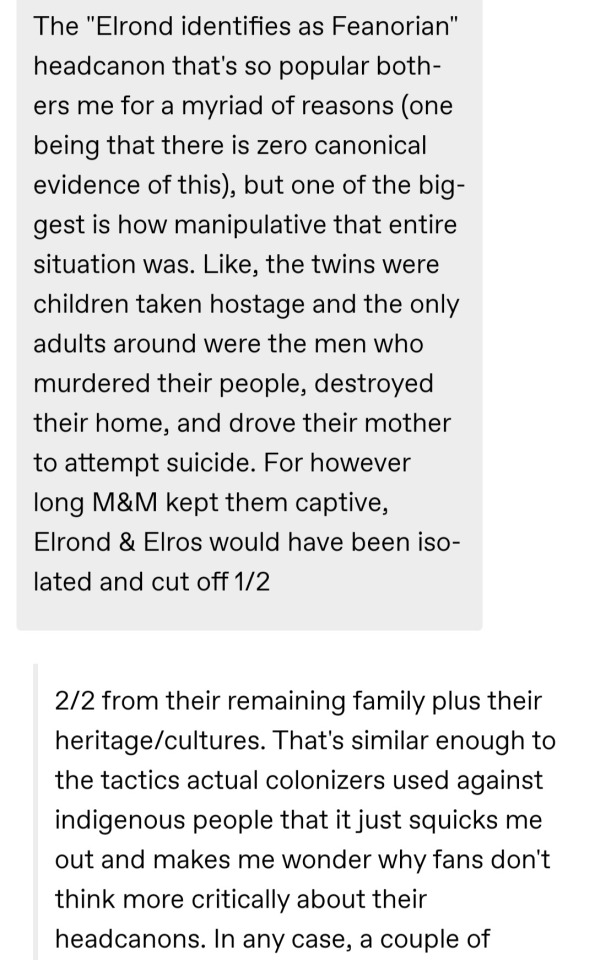
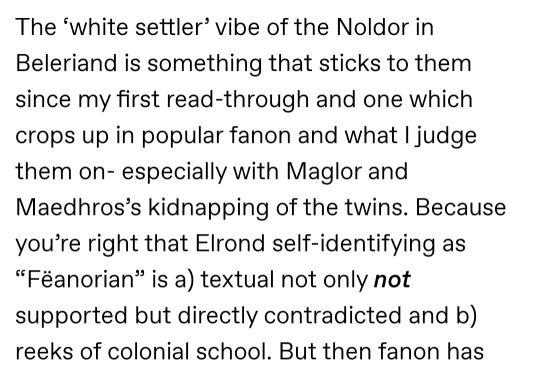
(Image description in alt text.)
Neither of the bloggers above are Indigenous. The person answering is a white American.
I'm going to explain why this is deeply offensive. There will be explicit discussions of genocide, colonisation, extreme child abuse, and residential schools. If you're someone directly affected by these issues and you're not in the headspace to read about it, this is a good place to tap out.
(I will also say right now that you absolutely should not attempt to find or harass the people who made this post. If you want to know the names for blocking purposes then message me privately @mearkaa.)
You are entitled to dislike whichever characters you want and to have whatever headcanons you want. I do not care how you feel about the Feanorians or about the Elrond and Elros situation.
Cultural disconnection is a deep seated trauma and one that I plan to talk about in the context of the twins, someday. That much is true. The OP could have drawn parallels to transracial adoption and the issues associated with that. But comparing it to the theft of Indigenous children and the residential school system is utterly abhorrent.
Yes, Elrond and Elros likely experienced the pain of cultural disconnection. But they were not part of systematic genocide. (While Doriath and Sirion were both attacked, that is not the same thing.) To compare it to residential schools belittles the sheer violence and horror of residential schooling systems.
Residential schools aren't just a US & Canadian phenomenon. There were (and in many cases still are):
Mexican Indigenous schools
India's Ashram schools
Malaysia's boarding schools
West Papua's boarding schools
Sami nomad schools
USSR Siberian Indigenous boarding schools
Australia's Stolen Generation
Peru's residential schools for Arakambut
Paraguay's boarding schools for Guarani
Capuchin Mission schools in Colombia and Venezuela
Brazil's Jesuit Manoki schools
There are many other cases of children stolen from their cultures for deliberate assimilation and cultural genocide. You can see it in the Sixties Scoop, NZ's Stolen Generations, the theft of Korean and Vietnamese children during the wars, the on-going racism in global adoption systems which see Black & Indigenous children taken at disproportionate rates for fewer reasons. And no discussion of stolen children would be complete without acknowledging how slavery saw generations of Black families repeatedly severed. The motive in this case was subtly different, but the results were no less devastating.
But the post specifically mentioned residential schools, and in the context of the OP being a white American, is likely referring to North America. So let's be clear.
Residential schools were tools for genocide. That was their purpose. Kill the Indian to save the man. You can't talk about the theft of Native children without the context of a genocidal system.
"We must either butcher them or civilise them, and whatever we do we must do quickly." - Henry Pancoast
Native children had their heads shaved because the schools knew that hair is deeply important in many Native cultures, linked to a person's fundamental identity. Expressing any form of their cultural identity or uttering a word of their native language was met with severe physical abuse. They were denied even their names.
It was so much more than just the theft of children. Those schools were places of torture and death. Thousands of children died and were buried without so much as a grave marker.
Frances Danger (Mvskoke/Seminole) explains in a speech she made to a Catholic Listening Session:
Your reeducation camps are the only schools where instead of graduating people say they survived. But let's be honest. Even though some of our relatives made it through, none of our young Native children ever really made it home.
If you take the worst possible view of Maedhros and Maglor's motives for raising Elrond and Elros - if you assume that they were taken as hostages, that there was little to no love, that the twins were completely disconnected from their Sindarin and Mannish heritage - it is still not comparable to a system that was created to annihilate entire peoples off the face of the earth.
It is not comparable to the generations after generations of children who were kidnapped, psychologically sexually and physically tortured, starved, neglected, experimented on, murdered, left to die, forced to watch each others' deaths and dig each others' graves. The priests who ran the schools raped Native girls and threw the resulting newborn infants into fireplaces in front of their teenage mothers. Often, families never found out what had happened to the children that they never saw again.
In places where these and similar practices were widespread, you will not find a single Indigenous person whose life hasn't been affected by them. This is our intergenerational pain. The trauma of our relatives' childhoods sits deep within them and has shaped our cultures, communities and families. There are thousands of unmarked graves being uncovered in North America over the last few years, but so many more will never be found. They are worldwide. They represent centuries of unimaginable horrors.
To use it as a petty point to justify your dislike of certain characters shows that you truly have no idea what was done to us.
17 notes
·
View notes
Text
Harad Through Fandom Eyes
Plenty of people acknowledge that LOTR's Haradrim, Easterlings and Variags are racist. However, I've seen less discussion about how fandom adds even more racism into the mix. This seems to be mostly because many people have very little knowledge about West Asia and North Africa, aka WANA [Why say WANA/SWANA instead of Middle East?] and what anti-WANA racism looks like.
I'm going to focus on Harad because this is the region that we know the most about. If you need a brief refresher:
Harad, or Haradwaith, is the region south of Gondor. There's a long history of violence between Harad and Gondor which dates back beyond Gondor even existed, to when Numenorians colonised Harad and repressed the people. Since then there were multiple wars and for long periods of time Gondor occupied parts of Harad. The Haradrim fight for Sauron in LoTR, partially due to their hatred of Gondor.
Harad is divided into two. Near Harad is strongly North Africa coded, and Far Harad is sub-Saharan Africa coded.

(Image description in alt text.)
Tolkien uses multiple different names to refer to the people of Harad (Haradrim, Southrons, Swertings, etc.) However, these seem to be the people of Near Harad, who he differentiates from the people of Far Harad. (There's some serious anti-blackness in this next quote, so skip over it if you need to. I only put it here as evidence that the use of Haradrim/Southrons in LOTR refers to Near Haradrim.)
[...] Easterlings with axes, and Variags of Khand, Southrons in scarlet, and out of Far Harad black men like half-trolls with white eyes and red tongues. - Return of the King
There is more to say on this than I would be able to fit into this post. There's a discussion to be had about Tolkien's textual and real life relationship with Black people. There's also a discussion that needs to be had about how Tolkien's racism is often excused with the idea that he was a 'benevolent' or well-meaning racist, a product of his time. It's an excuse that ignores the violence of quotations like this and the way that he wielded his whiteness against Black people in academia and writing.
I don't have time or space for those discussions in this post, but I want to acknowledge them.
What I want to discuss here is fandom portrayals of Haradrim. I'm not going to talk too much about the in-text racism, because that has been extensively covered elsewhere. But in summary:
The idea of the good white guys conquering the lesser brown 'Men of Darkness' is inherently racist
Tolkien's description of the Haradrim, such as repeatedly describing them as a cruel and warlike people, is also racist
The one paragraph where Samwise feels empathy for a dead Haradrim soldier does not lessen the racism.
With that out of the way, let's talk about fandom.
There's a gaping void in the information we're given about the Haradrim, so of course fandom attempts to fill the gaps. Fans often take inspiration from WANA. But many fans don't actually know that much about WANA and don't realise how much of their perception of it is based on racist and imperialist propaganda.
In fannish depictions, Harad all too frequently becomes an exotified fantasy that pulls from Western perceptions of WANA. Orientalist ideals of a mystical, magical, and yet dangerous place predominate the fannish idea of Harad.
The first thing that you should know about WANA is that it's an extremely culturally, religiously and geographically diverse place. If your depiction of Harad is entirely desert, or made of a culturally homogenous people with a narrow range of skin tones and features, you need to expand that. Equally, depictions of Harad as more 'socially backward' than other areas of Middle Earth stem directly from racist propaganda.
Too many stories write Harad as misogynistic and homophobic, often in direct contrast to other areas of Middle Earth. As many WANA people have pointed out, these kinds of sweeping generalisations are often specifically targeted at WANA because of racism.
Mysterious cursed objects from the 'far away lands of Harad', decadent sultans, the fetishization of cultural practices like belly dancing; these are all forms of Orientalism. Female characters may be sexualised, shown as seductresses or members of harems. (By the way, Westerners tend to have a very incorrect understanding of what harems actually are/were. They were the part of a Muslim household reserved for women and pre-pubescent boys. It was outsiders who perceived them as fundamentally sexual spaces and created the modern tropes of sexual harems.)
Male characters may be violent, cunning, greedy, dangerous and strange. There may be public executions and enslaved peoples, regardless of the complete absence of a textual basis. All of these things stem directly from racist ideas of WANA as 'barbaric' and 'uncivilised'.
In fact, Haradrim were once enslaved by Numenorians. They were victims of violent colonisation that continued into the days of Gondor. They have every reason to hate the 'Men of the West' and fight against them.
On a final note, the most major and dangerous WANA stereotype is the portrayal of WANA people as terrorists. This isn't a trope seen in Tolkien's works because it's primarily a post-911 phenomenon. But it's something that you must be conscious of if you're writing about Harad or other WANA-coded regions.
182 notes
·
View notes
Text
Three weeks until Tolkien of Colour Week!
Details here
26 notes
·
View notes
Text

Tolkien of Colour Week 2023, 31 July - 6 August
Any form of content is welcome 🙂 Tag @tolkienofcolourweek in your post and #tocweek2023. My main is @brighter-arda-main, if I dont like your post within 48 hours please message me.
This year there is a Ao3 collection!
The prompts below are only suggestions, you do not have to use them. There are two sets of prompts - Peoples | Themes. You can use both sets of prompts or just one.
Day 1: Ainu | Faith, Hope, Festivals
Day 2: Elves | Home, Lands, Journeys
Day 3: Men | Ancestors/Descendants, Tradition, Stories
Day 4: Dwarves | Music, Artwork, Clothing
Day 5: Hobbits | Family, Friendship, Romance
Day 6: Mixed | Community, Language, Belonging
Day 7: Freeform | Intersectionality, Sexuality, Gender, Intersex, Disability
Happy creating!
198 notes
·
View notes
Text
The issue with making the Bad Guys as ugly as possible isn't just that it always ends up being racist, ableist, antisemitic, or all of the above. Linking ugliness to evil and beauty to goodness is a bad thing in itself.
#personal thoughts#sponsored by me thinking about orcs#but this also applies much more broadly#'the creatures were deformed and scarred with dirty matted locs and btw they had hooked noses too! there is definitely no subtext to this'
135 notes
·
View notes
Text
I always refrain from posting my spicier takes on here but the world tests me. specifically, tolkien articles and academics test me.
#100%#i'm getting frustrated at some responses to my previous post which seem to think that good intentions excuse tolkien's racism#or that you have to qualify every discussion of his racism with 'he was a good guy though!'#perspective#racism in tolkien#tolkien fandom racism#skyeventide
5K notes
·
View notes
Text
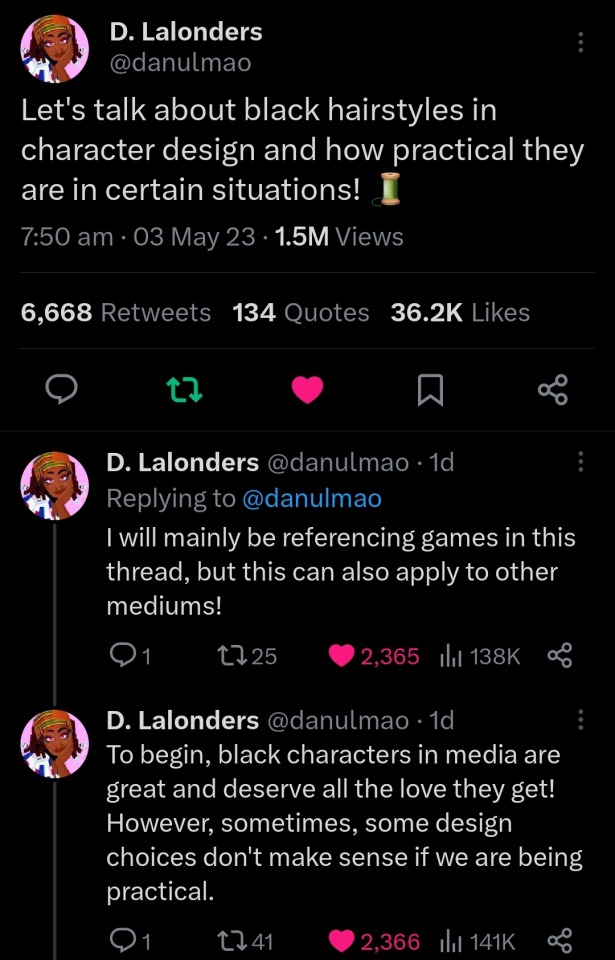
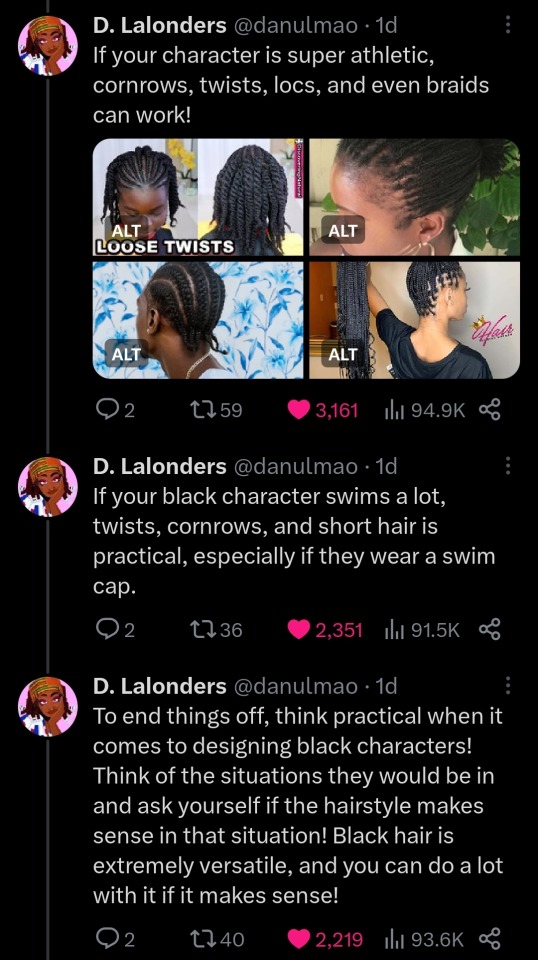
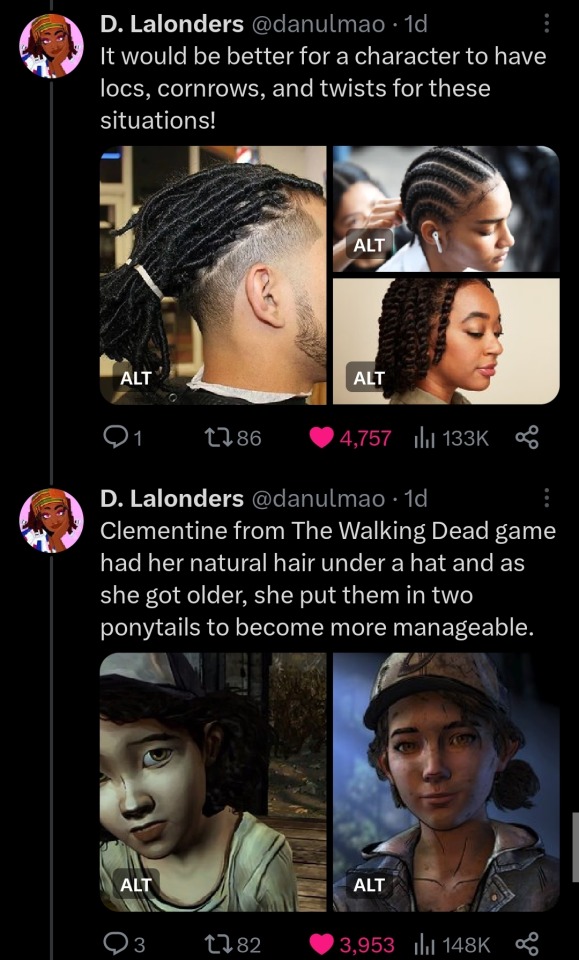
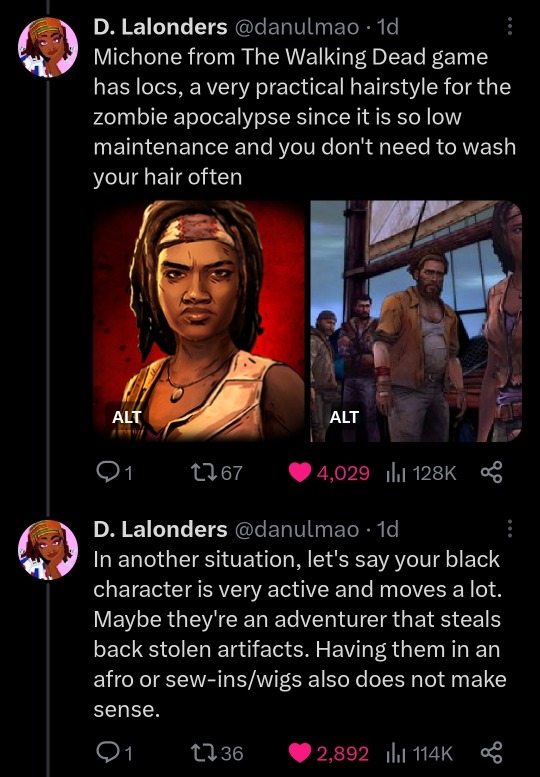
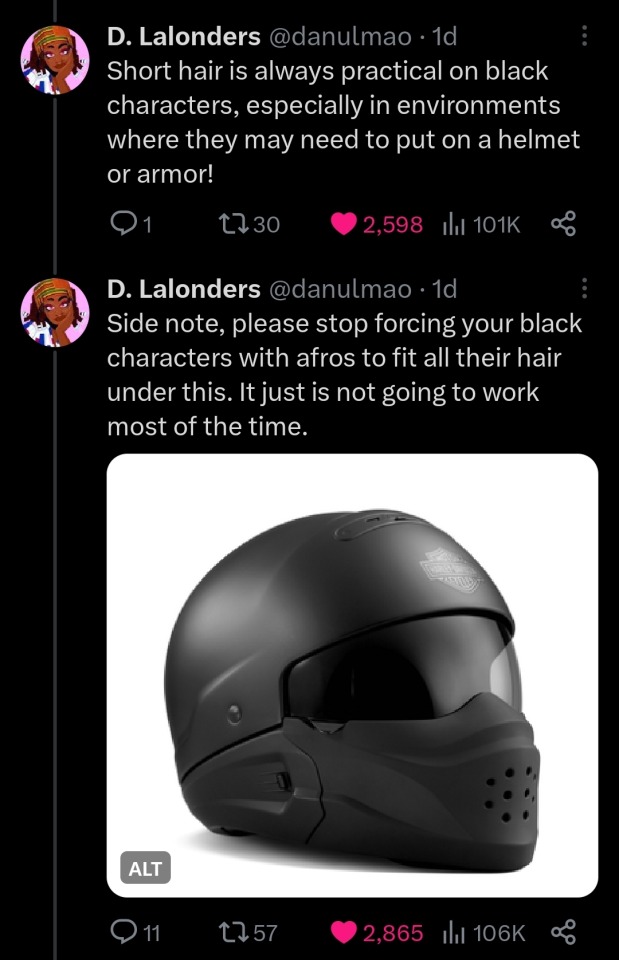
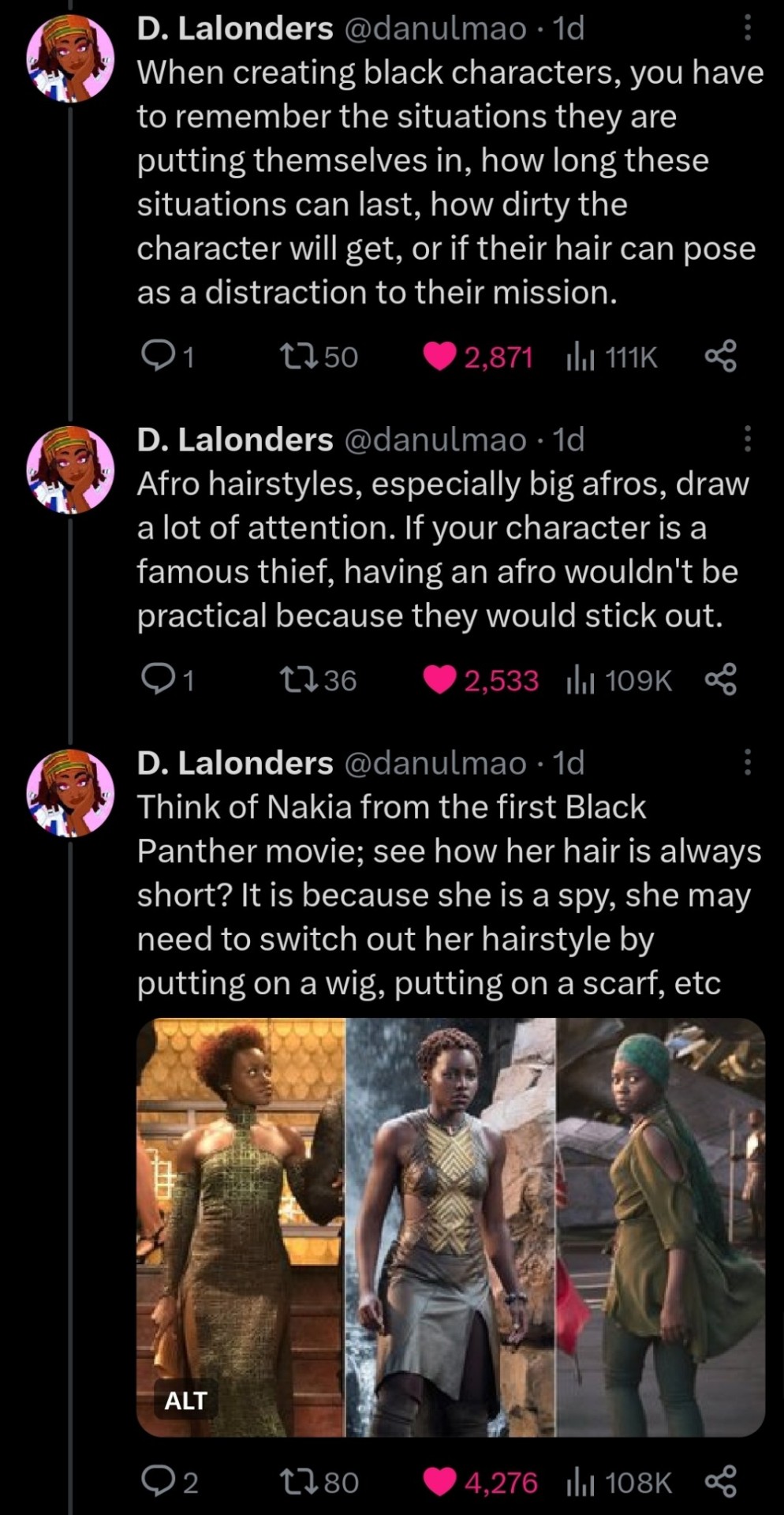
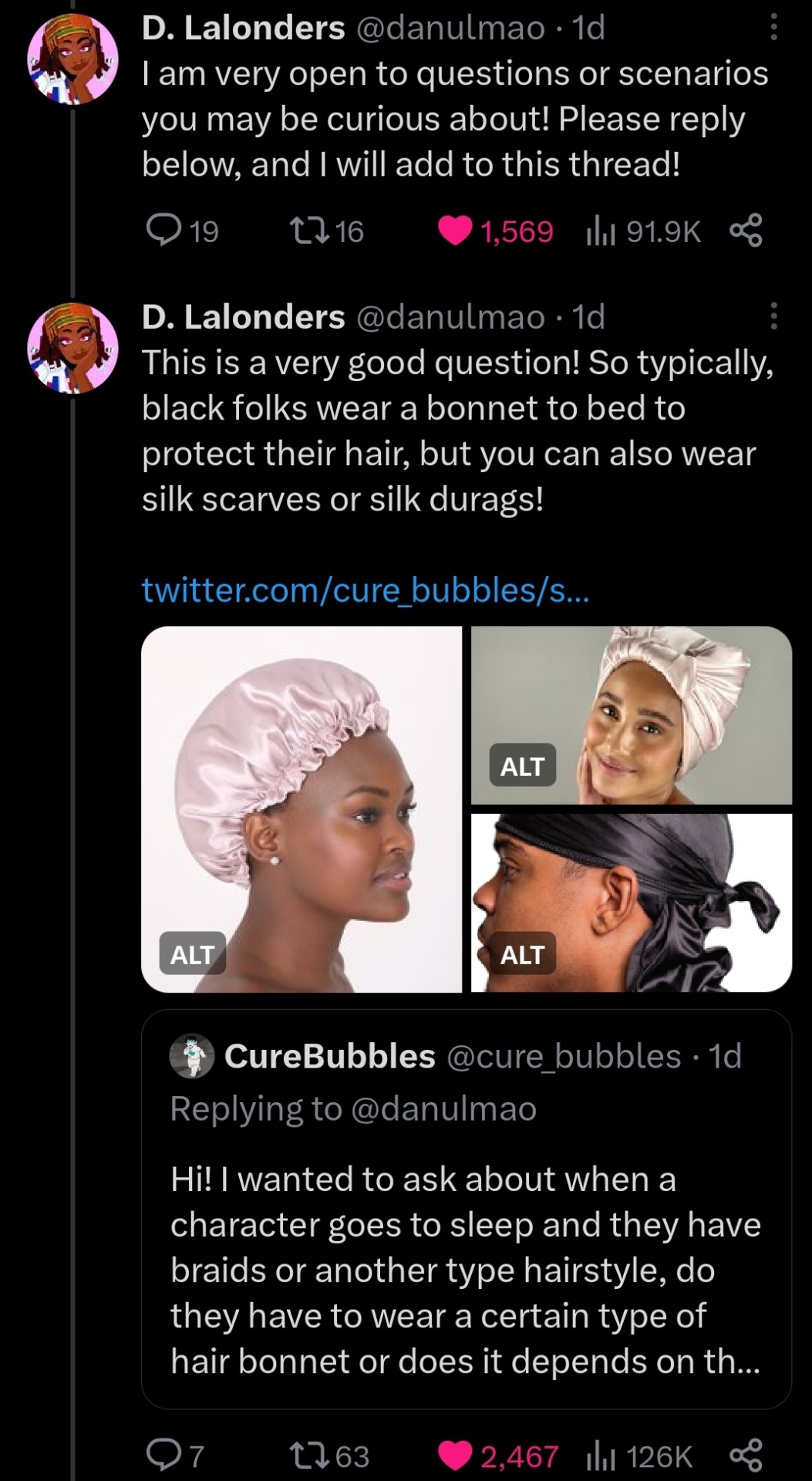
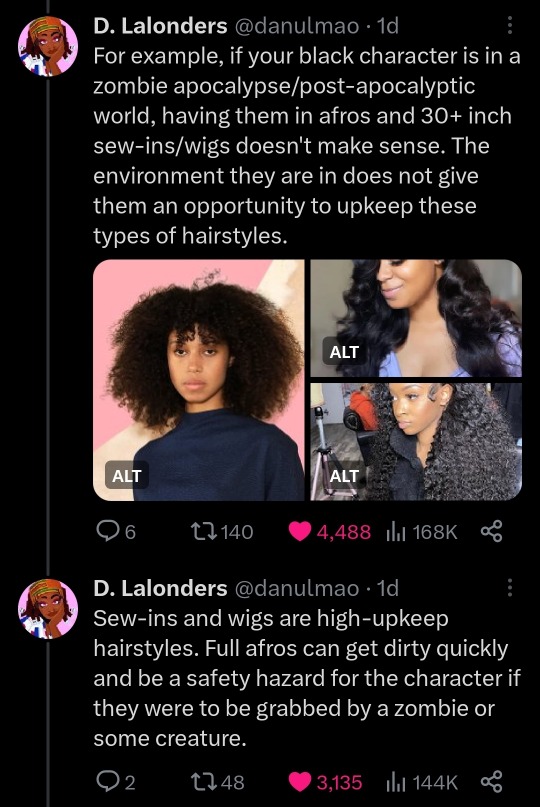
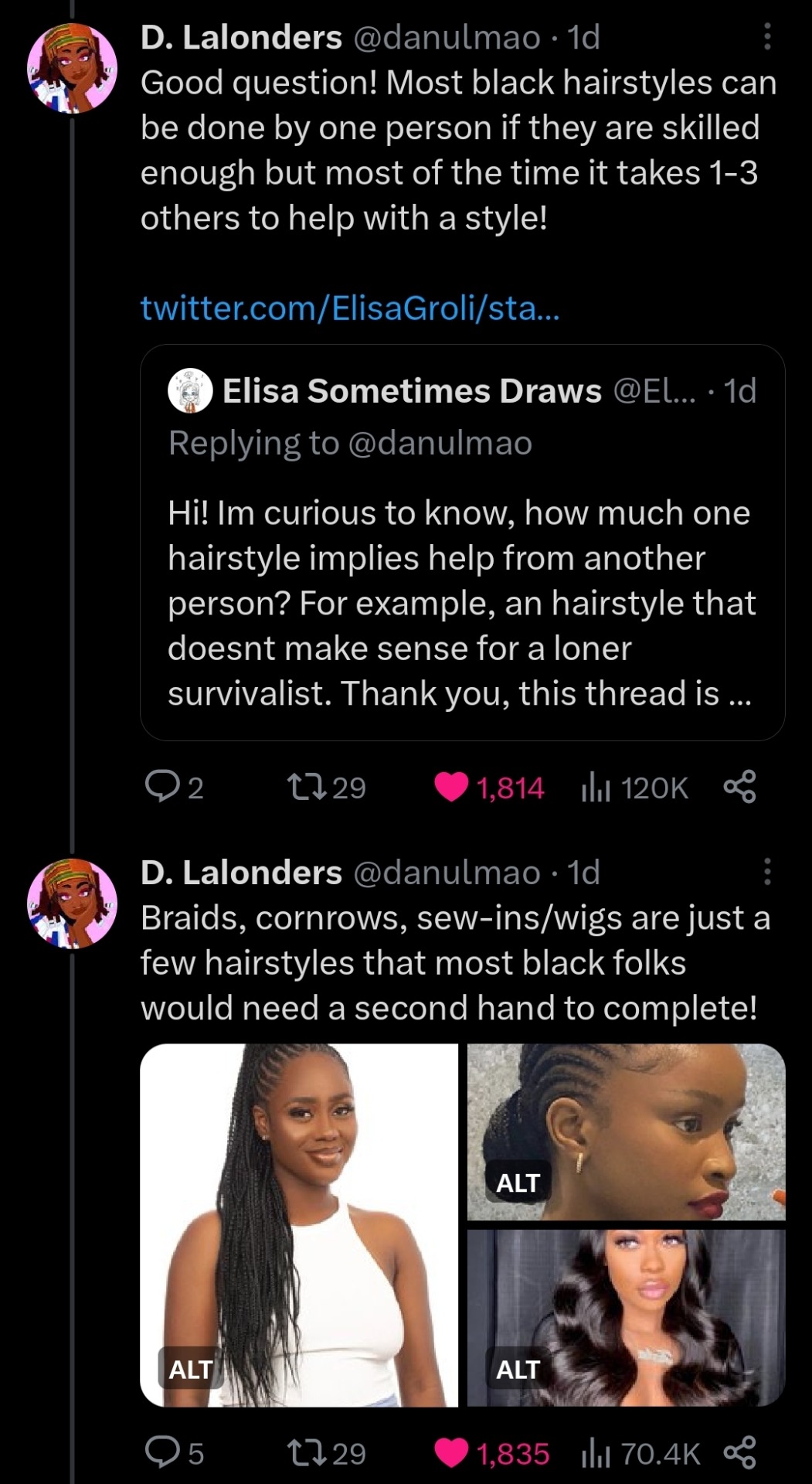
Image descriptions in alt text
Original thread
15 notes
·
View notes
